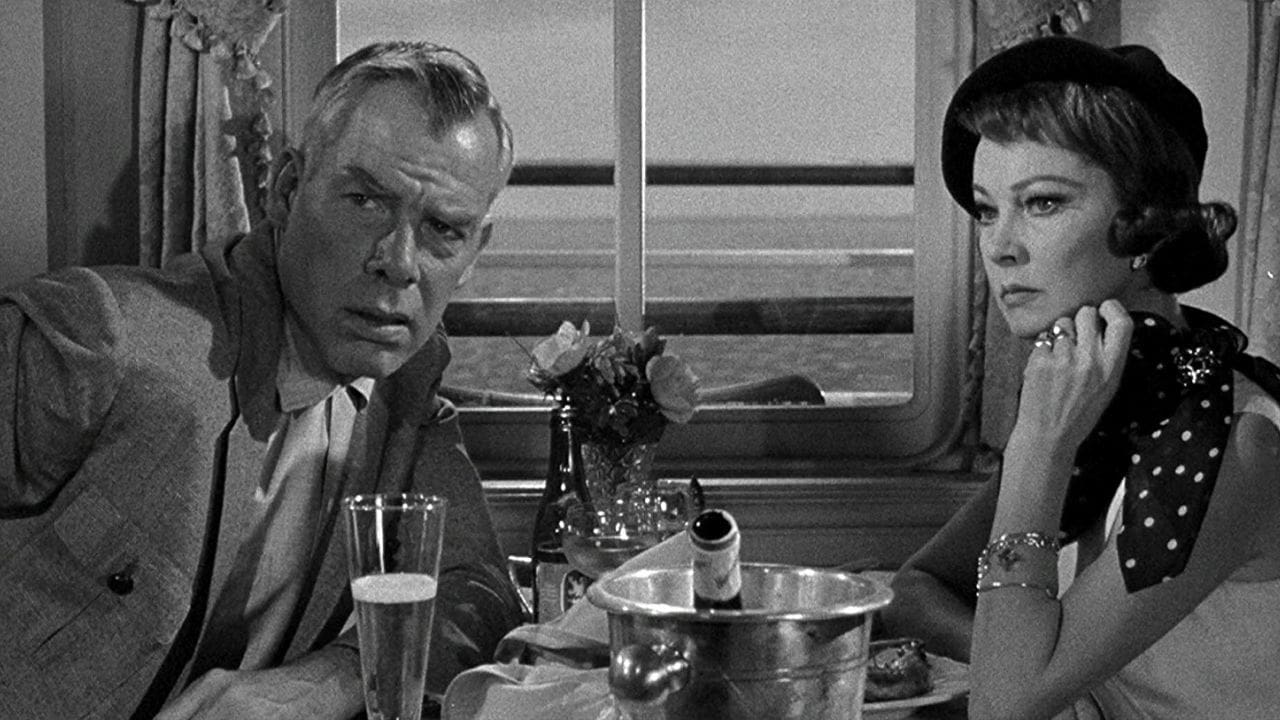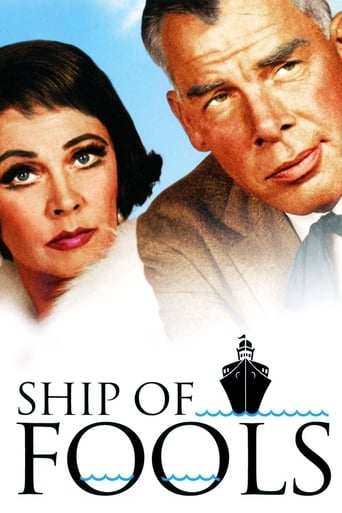

Stanley Kramer's movie legacy includes several great films that test the limits of individual freedom against the conventions, social pressures and threats that often dictate how we think and behave. These can come in conflict with our own judgement and conscience. In this movie, set on a German passenger ship in 1933, we encounter tragic figures who are at odds with the accepted standards or have found themselves isolated from the mainstream. The ones who try to follow the line of least resistance become rather pitiful themselves. The narrator Michael Dunn makes it clear in his opening and closing monologues that these characters could be any of us. Michael Dunn plays the role of a midget named Glocken, who is comfortable with living on the margin because his own stature has placed him there since his birth. Vivien Leigh as Mrs. Treadwell has become isolated by a loveless marriage where her husband's behaviour has made her a pariah. She took his money and spends her time on ocean liners leading a solitary life. A Jew on the ship is forced to eat at a separate table with the midget and another German who married a Jew is forced to join them because of the pro-Nazi sentiments of some of the passengers. The Contessa, played by Simone Signoret, is one person who put compassion into action, albeit controversial, supplying peasant workers with arms. In return, she faces a prison sentence. This behaviour seems to the viewer to be commendable given the other characters on the ship and is totally at odds with the passengers who turn away from Jews persecuted in their homeland. We see sad people trying to determine which of their fellow German passengers might have Jewish connections. Another couple are distraught by the near loss of a dog while showing no sympathy for the man who drowned trying to rescue it. The most interesting character is the doctor, played by Oskar Werner, who has a brief romance with Simone Signoret. A man of 41, he has already suffered a heart attack and senses his days may be numbered. He yearns for a life that he has not yet lived and admires the Contessa for her courage. The acting is excellent, particularly Werner, Signoret, and Leigh. Any of these people could be ourselves because of circumstances that unfold in a cruel and unforgiving world. The slow pace of the movie is not everyone's cup of tea but for me, the pace made it that much more enjoyable. Excellent character acting among the cast of characters make this movie a treasure.
... View MoreThere is a ship full of passengers in the film, but it is not Titanic, there's no icebergs either, with a satirical overtone, this Oscar-winning (BEST ART DIRECTION and CINEMATOGRAPHY in B&W section) film from Hollywood's ill-fated tycoon Stanley Kramer, who has nominated for 9 Oscars without a single win, could be best interpreted as a bourgeois lampoon to the times before WWII (1930s). The hotchpotch of the first-class passengers (from Mexico to Europe) depicted in the film are complying with the milieu of that particular period, notably the 3 Oscar-nominated performance from Simone Signoret, Oskar Werner and Michael Dunn (the latter is a very interesting example of a nomination from a normally pedestrian presence, I hope the dwarf card is not the case here), and judging by my taste, Heinz Rühmann and Vivien Leigh are also quite in the top form, especially Ms. Leigh, not to mention her turbulent real life status at that time, her frail with dignity performance is rather too harrowing to watch. However the true heartrending sympathy I am able to sense is from a divine Simone Signoret, a countess on exile, along with her foredooming love story with the inward doctor on board Oskar Werner. One thing niggling me is the film's aloof stance towards the poor underclass, they are living in another parallel world even though they are on the exactly same boat with those well-off patrons in the first class. I expected that the film could have gone much further by creating the contradictions between these two classes and which would be more emotionally radical to underline the more meaningful exposition on human's prejudices. But the film doesn't offer this on its tilted menu and most characters are indulging themselves in their own insignificant trifles which I easily lost my absorption to address myself to.
... View MoreThis film has a first rate cast like the great Vivien Leigh, Simone Signoret, Oskar Werner, Lee Marvin, Elizabeth Ashley, George Segal, Michael Dunn, Jose Ferrer, and others to write about here. The relationships that occurred on the ship seemed destined for failure. The voyage takes place in 1933 before Hitler becomes the dictator of Germany. Many of the passengers are Germans returning to their country. Not all, La Condensa (played by French actress Simone Signoret) is Spanish and develops a relationship with the ship's doctor played by Oskar Werner. The ending is a bit vague about the doctor's fate. Elizabeth Ashley and George Segal play an American couple who are in love but torn when they learn more about each other. Vivien Leigh only a few years before her own death plays a bitter American divorcée, Mrs. Treadwell. With good writing, she could have won her third Academy Award but didn't even get nominated. Lee Marvin plays a washed up baseball player. Michael Dunn is the philosophical dwarf who introduces us to the ship of fools. The film won two Oscars for cinematography and art direction both for black and white. The film doesn't shy away from the impending doom for the Jews in Germany and in Europe or the upcoming war in the future. It's horrifying to think that signs were missed. I think that's the horrifying part of films like this and Cabaret, you know what's coming and you want the cast to be prepared. Jose Ferrer is great in his role as a devout German. The film does show the class differences between the steerage and the upper decks as well. It's a fine film overall!
... View MoreShip of Fools (1965)The title is a giveaway, because it refers to a literary device where a handful of people are together in some restricted way, and their characters are revealed. As time goes on, we see how these different types, or archetypes, typically oblivious and ridiculous types, react to either their isolation or, often, to a crisis. It gets used more loosely in any shipwreck movie, like the Titanic movies. And the concept, in general, of seeing how different people react, and how we are all somewhat ignorant of how the world really works, is at the core of a lot of fiction and drama.And so Ship of Fools makes clear, with a narrator looking at the camera, that this is metaphorically (or actually, inside the larger metaphor) a ship of fools. Because we are on a ship carrying an array of passengers to a faraway country, it becomes literal, too, and in a way we look for the few sane people in the lot. The doctor (Oscar Werner) surely seems to fit the bill, and it's a virtuosic performance of a man trying desperately to find meaning, and to do the right thing. Vivien Leigh makes her final screen performance as a pathos filled aging woman.The time is the early 1930s, during the Nazi buildup (militarily and socially, changing and numbing normal morality), and the themes of the time are woven into the story. In fact, the boat is a German liner, and filled with Germans in first class. They really are fools, the most German of them all a happy go lucky Jewish man, and anti-Semitism is one of the few themes to actually lift its head to the surface, though not in a heavy handed way. Mostly the themes are more personal, and this could be a bunch of people from any country, sorting out differences, finding fleeting affections.The photography, which won an Oscar, is startling in its clarity, and it's complexity (see the scene, fairly early on, when they hose down 3rd Class, is amazing stuff). This is actually at the tail end of the era for a full blown black and white film, but I think they wanted to have it easily seen as a 1930s experience. Certainly the filming standards are right there with other 1960s masterpieces, and even as the story slows, you find yourself very happy to watch, to be a fool with the other fools on this very beautiful ride.
... View More